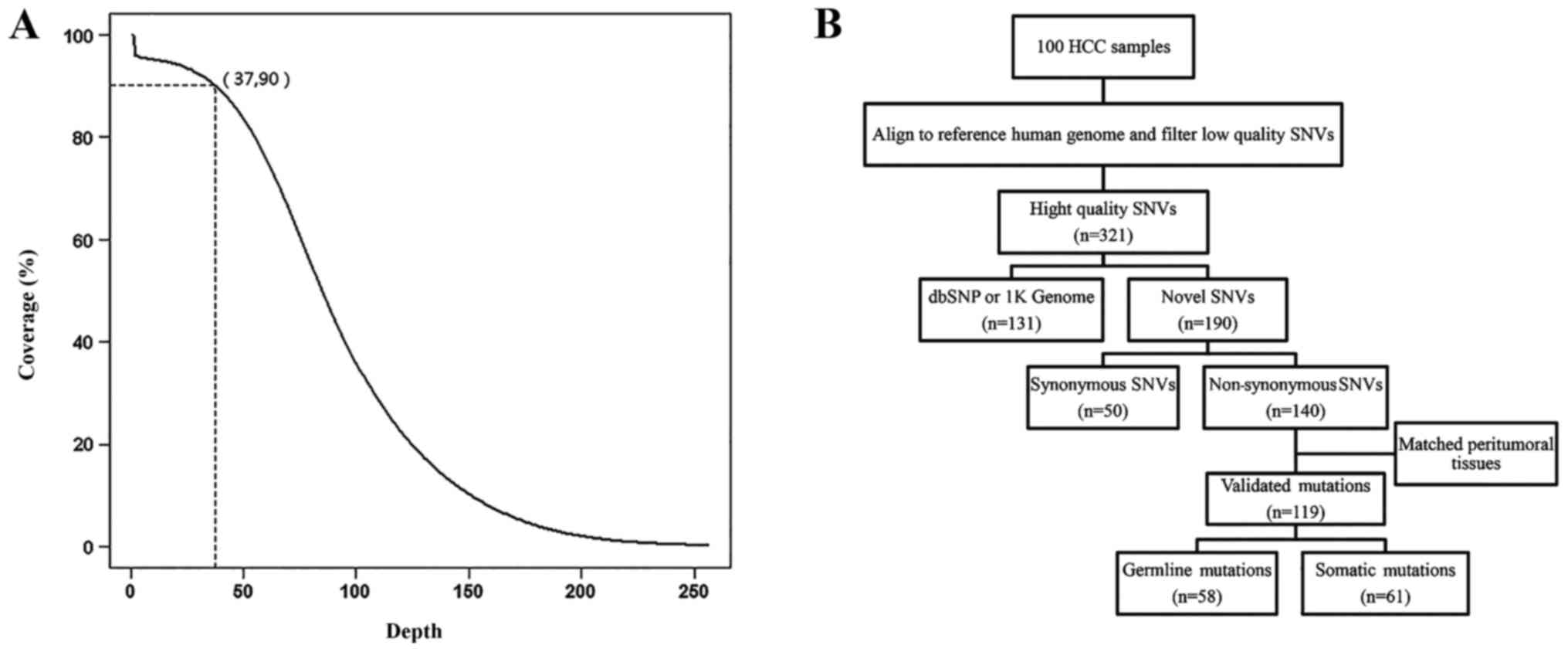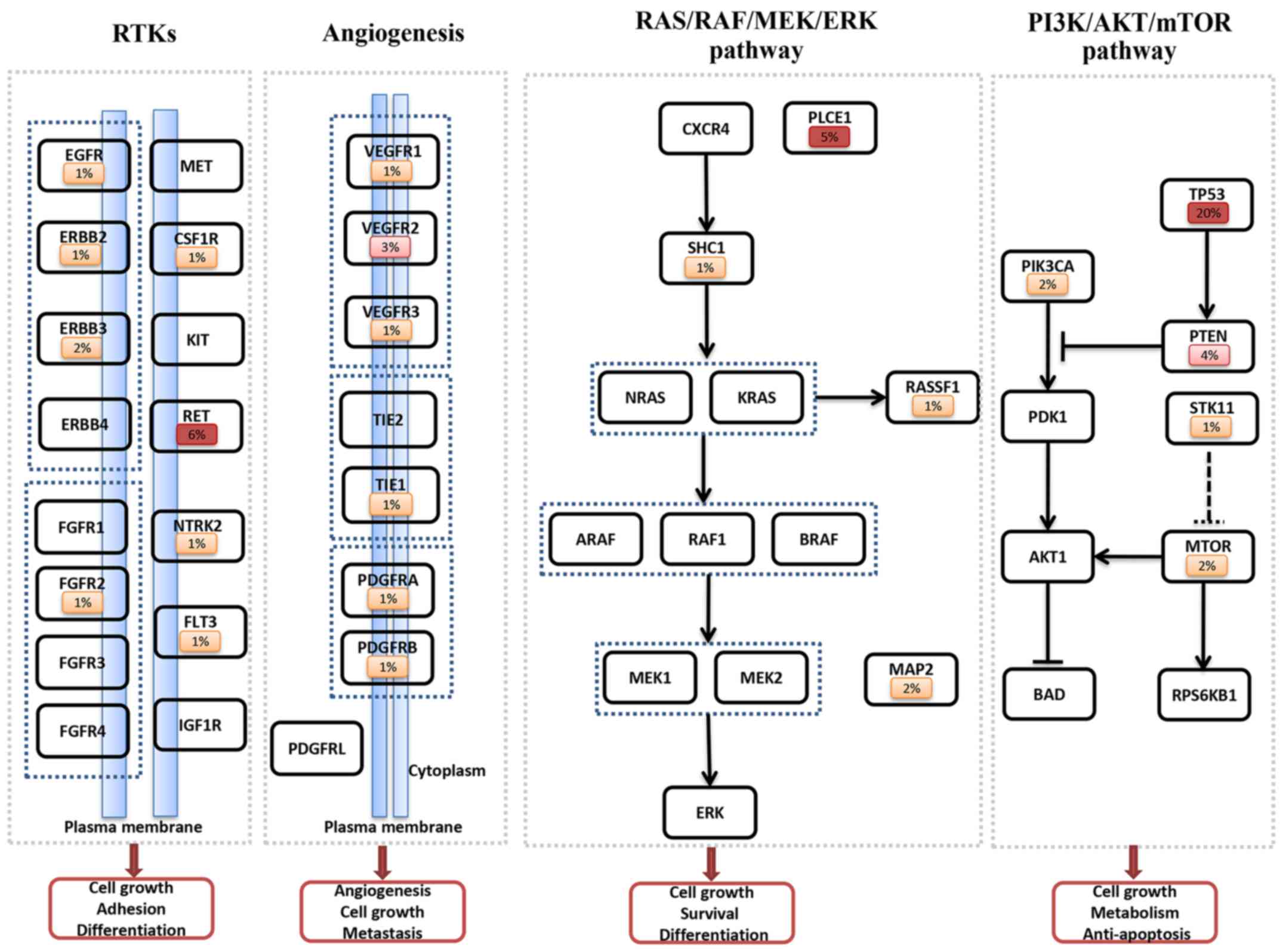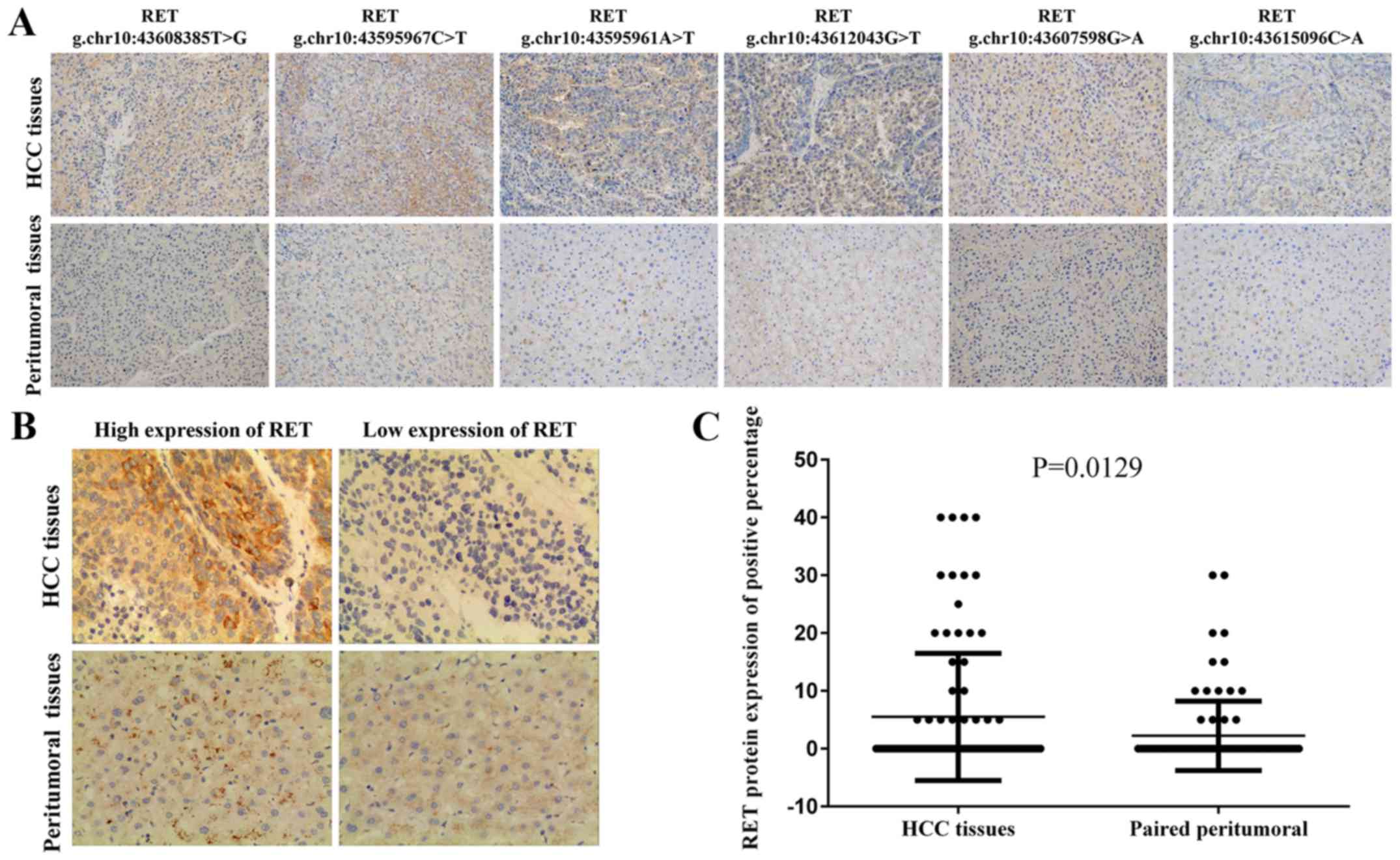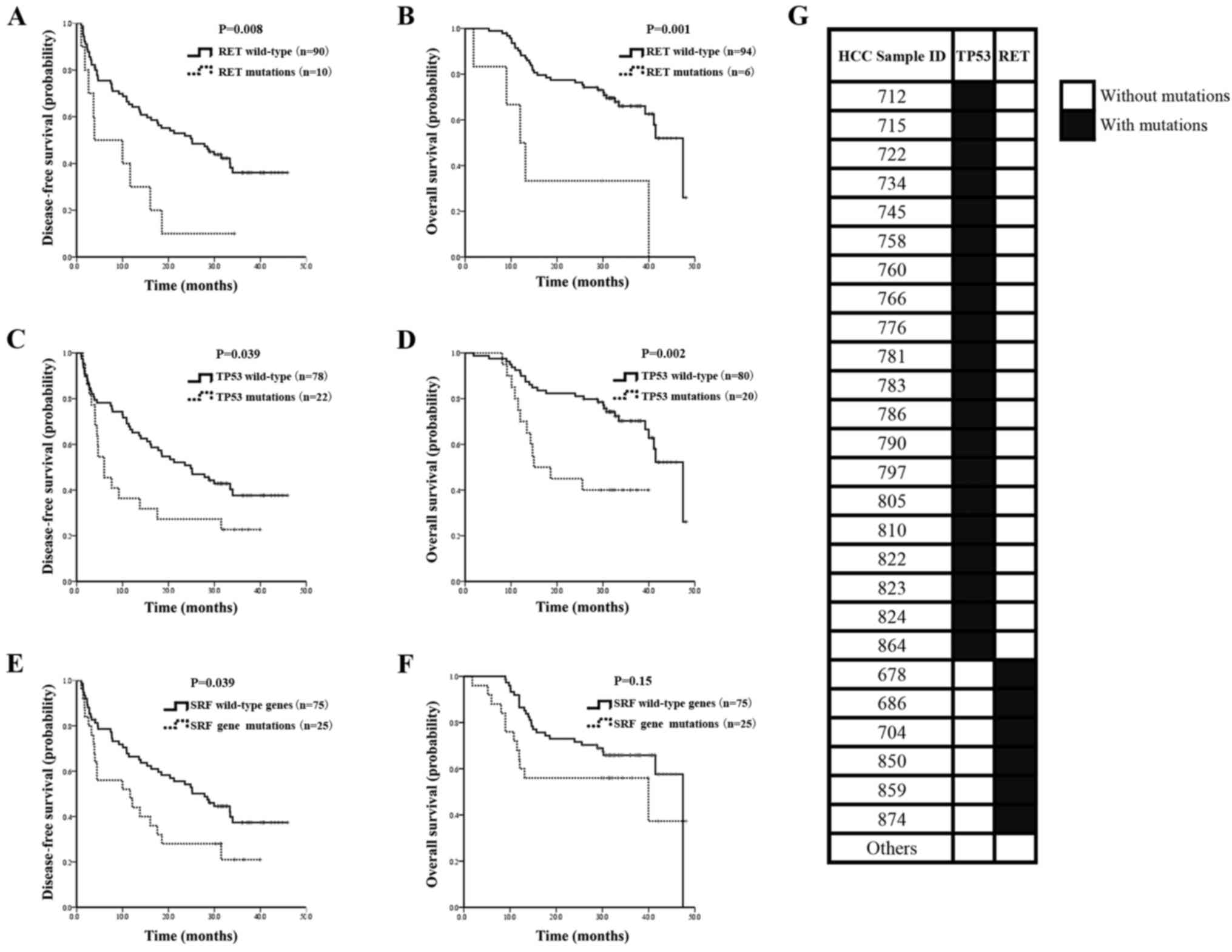|
1
|
Mittal S and El-Serag HB: Epidemiology of
hepatocellular carcinoma: Consider the population. J Clin
Gastroenterol. 47:(Suppl). S2–S6. 2013. View Article : Google Scholar : PubMed/NCBI
|
|
2
|
El-Serag HB: Epidemiology of viral
hepatitis and hepatocellular carcinoma. Gastroenterology.
142:1264–1273. 2012. View Article : Google Scholar : PubMed/NCBI
|
|
3
|
Tanaka M, Katayama F, Kato H, Tanaka H,
Wang J, Qiao YL and Inoue M: Hepatitis B and C virus infection and
hepatocellular carcinoma in China: A review of epidemiology and
control measures. J Epidemiol. 21:401–416. 2011. View Article : Google Scholar : PubMed/NCBI
|
|
4
|
Ferlay J, Shin HR, Bray F, Forman D,
Mathers C and Parkin DM: Estimates of worldwide burden of cancer in
2008: GLOBOCAN 2008. Int J Cancer. 127:2893–2917. 2010. View Article : Google Scholar : PubMed/NCBI
|
|
5
|
Rampone B, Schiavone B, Martino A, Viviano
C and Confuorto G: Current management strategy of hepatocellular
carcinoma. World J Gastroenterol. 15:3210–3216. 2009. View Article : Google Scholar : PubMed/NCBI
|
|
6
|
Villanueva A and Llovet JM: Targeted
therapies for hepatocellular carcinoma. Gastroenterology.
140:1410–1426. 2011. View Article : Google Scholar : PubMed/NCBI
|
|
7
|
Cheng AL, Kang YK, Chen Z, Tsao CJ, Qin S,
Kim JS, Luo R, Feng J, Ye S, Yang TS, et al: Efficacy and safety of
sorafenib in patients in the Asia-Pacific region with advanced
hepatocellular carcinoma: A phase III randomised, double-blind,
placebo-controlled trial. Lancet Oncol. 10:25–34. 2009. View Article : Google Scholar : PubMed/NCBI
|
|
8
|
Germano D, Tinessa V, Barletta E, Cannella
L and Daniele B: Targeted therapy for advanced hepatocellular
cancer in the elderly: Focus on sorafenib. Drugs Aging. 30:887–892.
2013. View Article : Google Scholar : PubMed/NCBI
|
|
9
|
Zhu AX: Molecularly targeted therapy for
advanced hepatocellular carcinoma in 2012: Current status and
future perspectives. Semin Oncol. 39:493–502. 2012. View Article : Google Scholar : PubMed/NCBI
|
|
10
|
Kudo M: Current status of molecularly
targeted therapy for hepatocellular carcinoma: Clinical practice.
Int J Clin Oncol. 15:242–255. 2010. View Article : Google Scholar : PubMed/NCBI
|
|
11
|
Tanaka S and Arii S: Current status of
molecularly targeted therapy for hepatocellular carcinoma: Basic
science. Int J Clin Oncol. 15:235–241. 2010. View Article : Google Scholar : PubMed/NCBI
|
|
12
|
Finn RS: Emerging targeted strategies in
advanced hepatocellular carcinoma. Semin Liver Dis. 33:(Suppl 1).
S11–S19. 2013. View Article : Google Scholar : PubMed/NCBI
|
|
13
|
Zang ZJ, Ong CK, Cutcutache I, Yu W, Zhang
SL, Huang D, Ler LD, Dykema K, Gan A, Tao J, et al: Genetic and
structural variation in the gastric cancer kinome revealed through
targeted deep sequencing. Cancer Res. 71:29–39. 2011. View Article : Google Scholar : PubMed/NCBI
|
|
14
|
Nikiforova MN, Wald AI, Roy S, Durso MB
and Nikiforov YE: Targeted next-generation sequencing panel
(ThyroSeq) for detection of mutations in thyroid cancer. J Clin
Endocrinol Metab. 98:E1852–E1860. 2013. View Article : Google Scholar : PubMed/NCBI
|
|
15
|
Cottrell CE, Al-Kateb H, Bredemeyer AJ,
Duncavage EJ, Spencer DH, Abel HJ, Lockwood CM, Hagemann IS, O'Guin
SM, Burcea LC, et al: Validation of a next-generation sequencing
assay for clinical molecular oncology. J Mol Diagn. 16:89–105.
2014. View Article : Google Scholar : PubMed/NCBI
|
|
16
|
Abecasis GR, Auton A, Brooks LD, DePristo
MA, Durbin RM, Handsaker RE, Kang HM, Marth GT and McVean GA: 1000
Genomes Project Consortium: An integrated map of genetic variation
from 1,092 human genomes. Nature. 491:56–65. 2012. View Article : Google Scholar : PubMed/NCBI
|
|
17
|
Zhu XD, Zhang JB, Zhuang PY, Zhu HG, Zhang
W, Xiong YQ, Wu WZ, Wang L, Tang ZY and Sun HC: High expression of
macrophage colony-stimulating factor in peritumoral liver tissue is
associated with poor survival after curative resection of
hepatocellular carcinoma. J Clin Oncol. 26:2707–2716. 2008.
View Article : Google Scholar : PubMed/NCBI
|
|
18
|
Forbes SA, Bindal N, Bamford S, Cole C,
Kok CY, Beare D, Jia M, Shepherd R, Leung K, Menzies A, et al:
COSMIC: Mining complete cancer genomes in the Catalogue of Somatic
Mutations in Cancer. Nucleic Acids Res. 39:D945–D950. 2011.
View Article : Google Scholar : PubMed/NCBI
|
|
19
|
Knox C, Law V, Jewison T, Liu P, Ly S,
Frolkis A, Pon A, Banco K, Mak C, Neveu V, et al: DrugBank 3.0: A
comprehensive resource for omics research on drugs. Nucleic Acids
Res. 39:D1035–D1041. 2011. View Article : Google Scholar : PubMed/NCBI
|
|
20
|
Fujimoto A, Totoki Y, Abe T, Boroevich KA,
Hosoda F, Nguyen HH, Aoki M, Hosono N, Kubo M, Miya F, et al:
Whole-genome sequencing of liver cancers identifies etiological
influences on mutation patterns and recurrent mutations in
chromatin regulators. Nat Genet. 44:760–764. 2012. View Article : Google Scholar : PubMed/NCBI
|
|
21
|
Dekervel J, van Pelt J and Verslype C:
Advanced unresectable hepatocellular carcinoma: New biologics as
fresh ammunition or clues to disease understanding? Curr Opin
Oncol. 25:409–416. 2013. View Article : Google Scholar : PubMed/NCBI
|
|
22
|
Llovet JM, Ricci S, Mazzaferro V, Hilgard
P, Gane E, Blanc JF, de Oliveira AC, Santoro A, Raoul JL, Forner A,
et al: SHARP Investigators Study Group: Sorafenib in advanced
hepatocellular carcinoma. N Engl J Med. 359:378–390. 2008.
View Article : Google Scholar : PubMed/NCBI
|
|
23
|
Kuhnert F, Tam BY, Sennino B, Gray JT,
Yuan J, Jocson A, Nayak NR, Mulligan RC, McDonald DM and Kuo CJ:
Soluble receptor-mediated selective inhibition of VEGFR and
PDGFRbeta signaling during physiologic and tumor angiogenesis. Proc
Natl Acad Sci USA. 105:10185–10190. 2008. View Article : Google Scholar : PubMed/NCBI
|
|
24
|
Chiu YL, Carlson DM, Pradhan RS and Ricker
JL: Exposure-response (safety) analysis to identify linifanib dose
for a Phase III study in patients with hepatocellular carcinoma.
Clin Ther. 35:1770–1777. 2013. View Article : Google Scholar : PubMed/NCBI
|
|
25
|
Bye H, Prescott NJ, Lewis CM, Matejcic M,
Moodley L, Robertson B, Rensburg C, Parker MI and Mathew CG:
Distinct genetic association at the PLCE1 locus with oesophageal
squamous cell carcinoma in the South African population.
Carcinogenesis. 33:2155–2161. 2012. View Article : Google Scholar : PubMed/NCBI
|
|
26
|
Palmer AJ, Lochhead P, Hold GL, Rabkin CS,
Chow WH, Lissowska J, Vaughan TL, Berry S, Gammon M, Risch H, et
al: Genetic variation in C20orf54, PLCE1 and
MUC1 and the risk of upper gastrointestinal cancers in
Caucasian populations. Eur J Cancer Prev. 21:541–544. 2012.
View Article : Google Scholar : PubMed/NCBI
|
|
27
|
Di Nicolantonio F, Arena S, Tabernero J,
Grosso S, Molinari F, Macarulla T, Russo M, Cancelliere C, Zecchin
D, Mazzucchelli L, et al: Deregulation of the PI3K and KRAS
signaling pathways in human cancer cells determines their response
to everolimus. J Clin Invest. 120:2858–2866. 2010. View Article : Google Scholar : PubMed/NCBI
|
|
28
|
Cleary SP, Jeck WR, Zhao X, Chen K,
Selitsky SR, Savich GL, Tan TX, Wu MC, Getz G, Lawrence MS, et al:
Identification of driver genes in hepatocellular carcinoma by exome
sequencing. Hepatology. 58:1693–1702. 2013. View Article : Google Scholar : PubMed/NCBI
|
|
29
|
Kan Z, Zheng H, Liu X, Li S, Barber TD,
Gong Z, Gao H, Hao K, Willard MD, Xu J, et al: Whole-genome
sequencing identifies recurrent mutations in hepatocellular
carcinoma. Genome Res. 23:1422–1433. 2013. View Article : Google Scholar : PubMed/NCBI
|
|
30
|
Woo HG, Wang XW, Budhu A, Kim YH, Kwon SM,
Tang ZY, Sun Z, Harris CC and Thorgeirsson SS: Association of
TP53 mutations with stem cell-like gene expression and
survival of patients with hepatocellular carcinoma.
Gastroenterology. 140:1063–1070. 2011. View Article : Google Scholar : PubMed/NCBI
|
|
31
|
Romei C and Elisei R: RET/PTC
translocations and clinico-pathological features in human papillary
thyroid carcinoma. Front Endocrinol. 3:542012. View Article : Google Scholar
|
|
32
|
Kohno T, Ichikawa H, Totoki Y, Yasuda K,
Hiramoto M, Nammo T, Sakamoto H, Tsuta K, Furuta K, Shimada Y, et
al: KIF5B-RET fusions in lung adenocarcinoma. Nat Med.
18:375–377. 2012. View Article : Google Scholar : PubMed/NCBI
|
|
33
|
Zeng Q, Cheng Y, Zhu Q, Yu Z, Wu X, Huang
K, Zhou M, Han S and Zhang Q: The relationship between
overexpression of glial cell-derived neurotrophic factor and its
RET receptor with progression and prognosis of human pancreatic
cancer. J Int Med Res. 36:656–664. 2008. View Article : Google Scholar : PubMed/NCBI
|
|
34
|
Plaza-Menacho I, Morandi A, Robertson D,
Pancholi S, Drury S, Dowsett M, Martin LA and Isacke CM: Targeting
the receptor tyrosine kinase RET sensitizes breast cancer cells to
tamoxifen treatment and reveals a role for RET in endocrine
resistance. Oncogene. 29:4648–4657. 2010. View Article : Google Scholar : PubMed/NCBI
|
|
35
|
Phay JE and Shah MH: Targeting RET
receptor tyrosine kinase activation in cancer. Clin Cancer Res.
16:5936–5941. 2010. View Article : Google Scholar : PubMed/NCBI
|
|
36
|
Fusco A, Grieco M, Santoro M, Berlingieri
MT, Pilotti S, Pierotti MA, Porta G Della and Vecchio G: A new
oncogene in human thyroid papillary carcinomas and their
lymph-nodal metastases. Nature. 328:170–172. 1987. View Article : Google Scholar : PubMed/NCBI
|
|
37
|
Grieco M, Santoro M, Berlingieri MT,
Melillo RM, Donghi R, Bongarzone I, Pierotti MA, Porta G Della,
Fusco A and Vecchio G: PTC is a novel rearranged form of the
ret proto-oncogene and is frequently detected in vivo in
human thyroid papillary carcinomas. Cell. 60:557–563. 1990.
View Article : Google Scholar : PubMed/NCBI
|
|
38
|
Takeuchi K, Soda M, Togashi Y, Suzuki R,
Sakata S, Hatano S, Asaka R, Hamanaka W, Ninomiya H, Uehara H, et
al: RET, ROS1 and ALK fusions in lung cancer. Nat Med. 18:378–381.
2012. View Article : Google Scholar : PubMed/NCBI
|


















